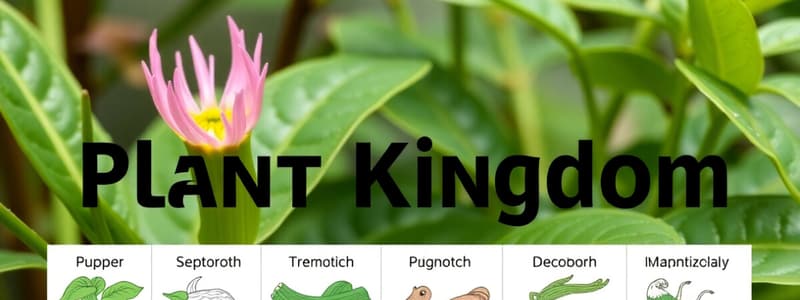Podcast
Questions and Answers
Which feature is characteristic of the plant kingdom?
Which feature is characteristic of the plant kingdom?
- All members are prokaryotic
- Members can be partial heterotrophs (correct)
- Cell walls are primarily made of lignin
- All plants reproduce asexually
What does the term 'alternation of generation' refer to in plants?
What does the term 'alternation of generation' refer to in plants?
- The two distinct life cycle phases in plants (correct)
- The variation of leaf types in a single species
- The seasonal variation in plant growth
- The transition from animal to plant forms
Cyanobacteria are no longer classified as algae because they are considered to be:
Cyanobacteria are no longer classified as algae because they are considered to be:
- Eukaryotes
- Prokaryotes (correct)
- Fungi
- Protists
Which classification system relied heavily on morphological characteristics?
Which classification system relied heavily on morphological characteristics?
What was a significant issue with early artificial classification systems of plants?
What was a significant issue with early artificial classification systems of plants?
Flashcards
Artificial Classification
Artificial Classification
The system of classifying organisms based on superficial characteristics, such as color, shape, and habit, rather than evolutionary relationships.
Kingdom Plantae
Kingdom Plantae
A major group of organisms within the plant kingdom that includes all eukaryotic organisms with chlorophyll, commonly called plants.
Alternation of Generations
Alternation of Generations
A process where the plant life cycle alternates between a haploid gametophytic stage (producing gametes) and a diploid sporophytic stage (producing spores).
Partial Heterotrophs
Partial Heterotrophs
Signup and view all the flashcards
Cell Wall
Cell Wall
Signup and view all the flashcards
Study Notes
Plant Kingdom Overview
- Whittaker (1969) proposed the Five Kingdom classification system: Monera, Protista, Fungi, Animalia, and Plantae.
- The plant kingdom classification has changed over time, now excluding some organisms previously included in Plantae (due to further understanding of cell walls)
- The current classification focuses on Algae, Bryophytes, Pteridophytes, Gymnosperms, and Angiosperms.
Salient Features of Plants
- Plants are eukaryotic organisms containing chlorophyll.
- Some plants are partial heterotrophs (e.g., Venus flytrap, bladderwort) or parasites (e.g., Cuscuta).
- Plant cells have a eukaryotic structure, prominent chloroplasts, and cell walls mainly composed of cellulose.
- Plants exhibit alternation of generation with distinct diploid sporophytic and haploid gametophytic phases.
- The relative lengths and dependence of these phases vary between plant groups.
Plant Classification (Artificial Systems)
- Early classification systems relied on superficial characteristics such as habit, colour, leaf shape, etc., and androecium structure.
- These artificial systems were often based on a small number of vegetative characteristics.
- These characteristics are often influenced by the environment and do not represent evolutionary relationships as accurately as more holistic characteristics.
Studying That Suits You
Use AI to generate personalized quizzes and flashcards to suit your learning preferences.




